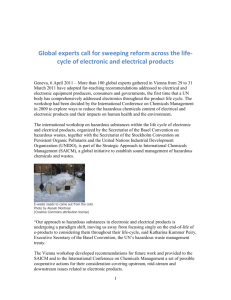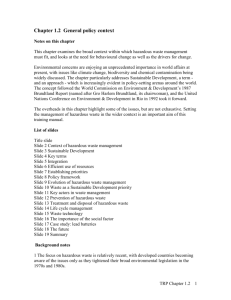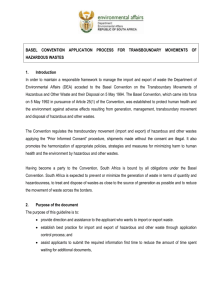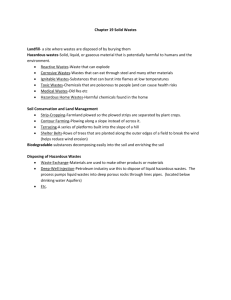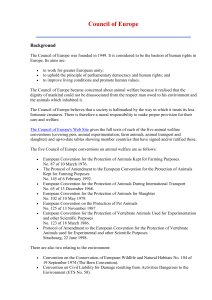Government of national unity and reconciliation
advertisement
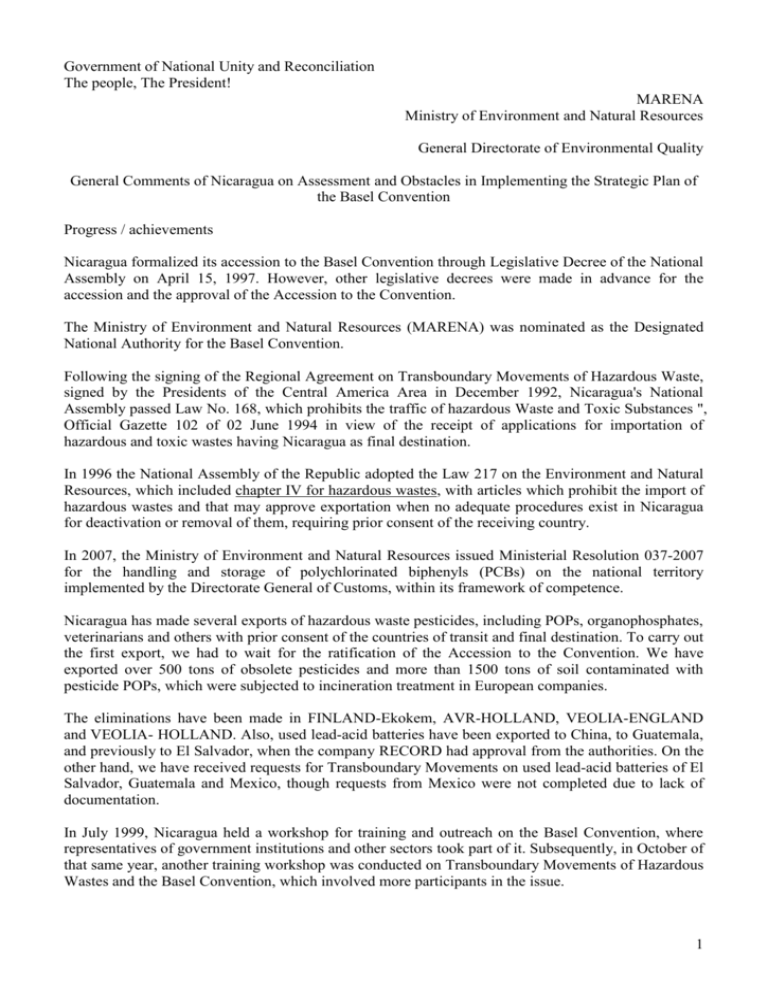
Government of National Unity and Reconciliation The people, The President! MARENA Ministry of Environment and Natural Resources General Directorate of Environmental Quality General Comments of Nicaragua on Assessment and Obstacles in Implementing the Strategic Plan of the Basel Convention Progress / achievements Nicaragua formalized its accession to the Basel Convention through Legislative Decree of the National Assembly on April 15, 1997. However, other legislative decrees were made in advance for the accession and the approval of the Accession to the Convention. The Ministry of Environment and Natural Resources (MARENA) was nominated as the Designated National Authority for the Basel Convention. Following the signing of the Regional Agreement on Transboundary Movements of Hazardous Waste, signed by the Presidents of the Central America Area in December 1992, Nicaragua's National Assembly passed Law No. 168, which prohibits the traffic of hazardous Waste and Toxic Substances ", Official Gazette 102 of 02 June 1994 in view of the receipt of applications for importation of hazardous and toxic wastes having Nicaragua as final destination. In 1996 the National Assembly of the Republic adopted the Law 217 on the Environment and Natural Resources, which included chapter IV for hazardous wastes, with articles which prohibit the import of hazardous wastes and that may approve exportation when no adequate procedures exist in Nicaragua for deactivation or removal of them, requiring prior consent of the receiving country. In 2007, the Ministry of Environment and Natural Resources issued Ministerial Resolution 037-2007 for the handling and storage of polychlorinated biphenyls (PCBs) on the national territory implemented by the Directorate General of Customs, within its framework of competence. Nicaragua has made several exports of hazardous waste pesticides, including POPs, organophosphates, veterinarians and others with prior consent of the countries of transit and final destination. To carry out the first export, we had to wait for the ratification of the Accession to the Convention. We have exported over 500 tons of obsolete pesticides and more than 1500 tons of soil contaminated with pesticide POPs, which were subjected to incineration treatment in European companies. The eliminations have been made in FINLAND-Ekokem, AVR-HOLLAND, VEOLIA-ENGLAND and VEOLIA- HOLLAND. Also, used lead-acid batteries have been exported to China, to Guatemala, and previously to El Salvador, when the company RECORD had approval from the authorities. On the other hand, we have received requests for Transboundary Movements on used lead-acid batteries of El Salvador, Guatemala and Mexico, though requests from Mexico were not completed due to lack of documentation. In July 1999, Nicaragua held a workshop for training and outreach on the Basel Convention, where representatives of government institutions and other sectors took part of it. Subsequently, in October of that same year, another training workshop was conducted on Transboundary Movements of Hazardous Wastes and the Basel Convention, which involved more participants in the issue. 1 Between 2004 and 2005 MARENA coordinated the execution of the Project for Enabling Activities for Persistent Organic Pollutants (POPs), funded by GEF, and by exploiting this platform and combining resources a compendium of the three Conventions, Stockholm, Basel and Rotterdam was published, and all 1,000 printed copies were distributed in the various project activities. Likewise, during the various activities undertaken by the project, the dissemination of information on the Basel Convention and synergies linked to the three Conventions was included. Considering the platform and project financing Enabling POPs with the other Conventions, and in order to have a framework for regulating substances and hazardous wastes produced, the National Policy for the Management of Hazardous Substances and Waste was elaborated, which was approved by Presidential Decree No. 91-2005 of 21 November 2005. In 2006 a national inventory of PCBs was conducted and training and outreach activities to various sectors were implemented, especially meetings were held with staff at borders and decision makers on Customs of Nicaragua, where one of the main topics was on the Basel Convention, for the import / export of hazardous wastes. Likewise, the national company of electric transmission and distribution of energy has continued to carry out inventories of PCBs, supported by MARENA. This year, Nicaragua conducted a pilot project on inventory of mercury emissions in different surroundings, environment and health, which aims to know the national capabilities and institutionalize the inventory of such substances, which will be funded by UNITAR. Similarly, this year the SAICM Quick Start project will be implemented, including updating the Chemical Safety Profile of the country. MARENA has increased the number of licenses for the management and reuse of dielectric transformers used oils that do not contain or are not contaminated with PCBs. At the subregional level, we participated in various meetings organized by NGOs (RAPAL) to exchange and raise awareness on the progress we made concerning the three Conventions (Stockholm, Basel and Rotterdam). As for electronic waste, we have initiated discussions with the NGO HABITAR to develop activities or instruments for the regulation and management of electronic wastes in the country. We fully agree that we must comply with the provisions as specified in Article 4 of the Convention, referred to the Strategic Plan and the New Strategic Framework, as well for the rest of the articles and their amendments. MARENA is responsible to implement all the provisions of the Basel Convention, with regard to hazardous waste requiring national regulations and involving other countries. At present, we inventoried approximately 6.7 tons of POP pesticides, waiting to be disposed of in an environmentally safe manner, and for which some efforts were made for the transboundary movement. Moreover, there are more than 30 tons of other pesticides that are remnants, which were abandoned and that expired in warehouses used for the last amount, which entered the store. As for POPs, the remaining obsolete stock are due to the prohibitions that were made in 1993 and ratified in 2001. Together, the Ministry of Environment and Natural Resources, the Center for Procedures and Exports (CETREX) and the Directorate General of Customs of Nicaragua are controlling exports of used batteries for recycling to comply with the provisions of the Convention. In February 2008 in Panama, it was agreed that the Secretariats of the Conventions would make an effort to combine resources to address the activities of the Conventions and to include in meetings the three sectors directly involved, such as environment, health and agriculture to ensure a better 2 knowledge, awareness and national and international responsibilities, which each country must meet for each Convention. We shall review articles related to national bans and exports of hazardous wastes. Moreover, the national legislation defines waste, hazardous waste and hazardous substances and in which cases they may be exported. Regarding ship dismantling, Nicaragua does not carry out such activities. However, it has authorized a national company to receive from these facilities oily wastewater for treatment and disposal, which is closely coordinated with the National Port Company and the Ministry of Transport and Infrastructure and applying the Guidelines under MARPOL Convention. Disadvantages The lack of external funding has been the main reason to address and improve the situations of regulation, training, dissemination of the Convention, as well as lack of personnel dedicated to monitoring and compliance for the implementation of what is established in the Convention, even though the country and institution has the intention to do so, as shown. The idea persists that companies send hazardous waste to our country, disguised as raw materials or to be reused in certain activities without management mechanisms, such as used tyres, secondhand computer equipment, management of pesticide containers and the growing industry of plastic containers for food, which are a serious problem in our country. The few companies involved in recycling any waste, such as lead-acid batteries, usually do their work informally on a small scale and are constantly causing environmental and health problems. There are still regional projects on battery (BAPU) outstanding, which are agreed to be undertaken through the Regional Center, in El Salvador. It is necessary to improve coordination with developed countries, because last year (2008) we had a notification from Hong Kong - China to return a shipment of used batteries with lead wastes which did not have the authorization of that country to import, and likewise the Ministry of Environment was unaware of these transboundary movements, which were being made without the respective communications of the case. Exports were disguised as metallic scrap. As a consequence, we improved customs controls and exports procedures. It is necessary for the Secretariat of the Convention to support financially the implementation of strategic plans to meet what is expected for the next biennium. We believe that the Secretariat of the Convention should continue its efforts with the developed and industrialized countries to obtain and provide sufficient assistance to countries that lack the funds to develop activities and actions as required by the Convention. Hence, we agree with an increase in cooperation, merging resources to improve coordination among the three conventions, given the economic situation in our countries. However, participation in meetings of the conventions is where a problem was detected, since all parties involved were not included in the planning of the Rotterdam, Basel and Stockholm conventions, only one of designated authority. The problem is that sometimes other parties are not aware until after the activities. We need to organize more technical regional meetings to plan, learn and develop activities committed for the next period, including activities for 2009 and 2010, which could be financed by the Convention and coordinated by Regional and Subregional Centers, since these Centres should have more projection, representativity and constant work in the tasks that we have to develop as a region and countries in order to have better living conditions. 3 We propose arrangements to be made for financing Subregional Centers and that these improve the links between the Secretariat and countries to undertake activities such as the receipt of comments previously indicated on the annual, biannual commitments or for each assessment period, as in the case of the Strategic Plan. A representative of the Convention’s Secretariat could be involved in these activities to gather and explore the topics or convene separately the representatives of the Basel Convention Regional and Subregional Centers to gather information and the programming of new activities, and may also bring together countries to get feedback on the current Strategic Plan and new Strategic Framework. The latter would be in order to save money or to establish a better interaction mechanism. We believe it is very necessary that the parties, before receiving any waste, must clearly identify the dangers to health, environment and agriculture, must count with safety data sheets in Spanish, and should also be addressed to Customs Authorities, because the import of a hazardous waste and its entry in the country leads to the search of alternatives for disposal and one of these is the export because there is no infrastructure to do so in the country. It is necessary to provide documents in the official languages of the countries (Spanish) as soon as possible because it is one of the officially established languages for translation of documents. Prepared by: Engineer María Amparo Vallejos Vallejos, Specialist in Environmental Management Directorate of Chemical Safety, Department of Environmental Quality, Ministry of Environment and Natural Resources (MARENA) Reviewed by: Degree Helio C. Zamora, Director of Chemical Safety Department of Environmental Quality, Ministry of Environment and Natural Resources (MARENA) Clearance by: Degree Hilda Espinoza U. Director General Department of Environmental Quality, Ministry of Environment and Natural Resources (MARENA) Managua, Nicaragua, Tuesday, February 27, 2009 4
